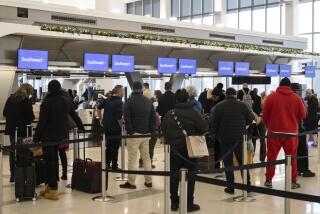U.S. Unveils Plans to Combat Terrorism
- Share via
WASHINGTON — Federal officials announced a series of steps Thursday to combat terrorism, including recommendations to make $300 million in improvements to airport security that would see the government assume more of the burden for ensuring that passengers and cargo on commercial aircraft are safe.
Fifty days after an explosion brought down Trans World Airlines Flight 800, Vice President Al Gore announced recommendations to install advanced explosives-detection devices at almost all airports, add more bomb-sniffing dogs and conduct selected “profiling” of airline passengers.
At the same time, Atty. Gen. Janet Reno said federal law enforcement agencies will beef up their anti-terrorism units and CIA Director John M. Deutch said more agents will be assigned to track terrorism.
Gore said the airport-security improvements “are tough, they are doable and we’re going to get them in place quickly and effectively.”
“We may never see an end to terrorism,” Gore said. “But we are sure going to do our level best to combat it.”
In addition, the government, and not the airlines, would assume the delicate task of notifying the families of plane crash victims. After the July 17 TWA crash, the airline was sharply criticized for being slow to release a passenger manifest.
Gore’s recommendations go to President Clinton on Monday and will require congressional approval, particularly in the form of a supplemental budget expenditure to finance the new technology and other security measures.
But some observers argued that funds are already available to pay for the new security.
Marty Salfen, a senior vice president for the International Airline Passengers Assn., said there is a $10.5-billion surplus in federal surcharges collected by airports. “Three-hundred-million dollars is a drop in the bucket when you already have a $10.5-billion excess,” he said.
Gregory T. Nojeim, legislative counsel for the American Civil Liberties Union in Washington, said he was concerned about the elements of the government’s plan to create computer profiles of selected passengers who might match a terrorist suspect.
Characteristics that might fit into such profiles include paying for tickets in cash and flying infrequently.
“At the airport counter, passengers check only their luggage, not their rights to personal security, privacy and equality,” Nojeim said.
The new measures are not likely to inconvenience passengers immediately or to slow down the current baggage-check-and-retrieval system. “There’s no practical way to screen and check 750 million bags a year domestically,” Salfen said.
A move to shift a large number of FBI agents to anti-terrorism duties will be announced soon by the president, Reno said. Although she declined to say how many agents would be reassigned, sources have said it could be as many as 500, or 5% of the FBI’s force.
“We’ve got to be constantly prepared, and I think that this is just an example of prudent management,” Reno said.
Deutch said his agency is “deploying a significant number of additional” agents to its counter-terrorism center, which monitors operations overseas.
In a speech at Georgetown University, Deutch also said he was expanding the CIA’s intelligence support intended to protect military facilities abroad.
“What we intend to do now is give the president more options for action against foreign terrorists to further preempt, disrupt and defeat international terrorism,” Deutch said.
Elsewhere Thursday, federal authorities investigating the TWA crash said underwater recovery efforts have been suspended by high seas but that Navy divers searching the crash site have spotted “relatively large pieces” of the aircraft, including some seating track, a chunk of fuselage and oxygen masks.
Rear Adm. Edward Kristensen said he hopes that the divers can resume salvage operations by the middle of next week.
And Robert Francis, vice chairman of the National Transportation Safety Board, said the number of victims recovered still stands at 211, which leaves 19 still missing.
Francis had an unexpected dunking Thursday when a large ocean swell swept him out of a boat as he rode to one of the investigation’s salvage ships, the Grapple. He was quickly rescued and was not hurt.
Times staff writer James Gerstenzang contributed to this story.
More to Read
Sign up for Essential California
The most important California stories and recommendations in your inbox every morning.
You may occasionally receive promotional content from the Los Angeles Times.














